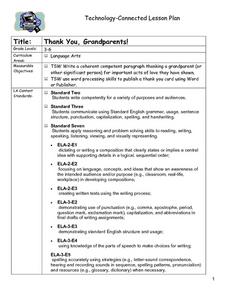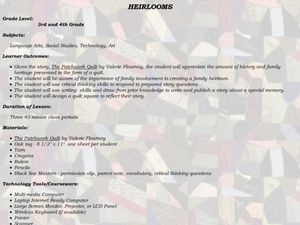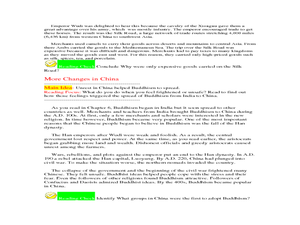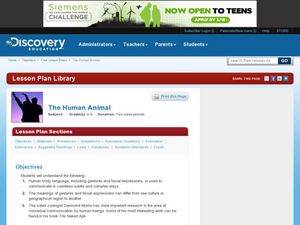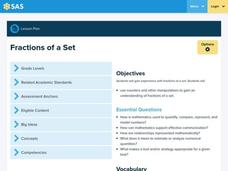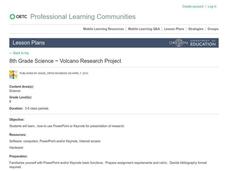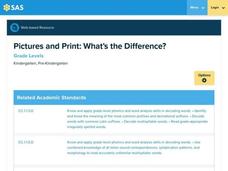Curated OER
Thank You, Grandparents!
Pupils share important moments with their grandparents. Individually, they write one paragraph thanking them for being in their lives or for a specific event they have been involved in. They also identify ways they act like their...
Curated OER
How Many Ice Creams?
Students discuss their favorite ice cream flavors and read the math problem. They brainstorm the problem and brainstorm for ways to solve the problem. Students work in pairs and share solutions.
Curated OER
Calculator Count to 1000
Students develop an understanding that large numbers are made up of smaller ones. They develop multiples by skip counting with a calculator to 1000. They share their lists and patterns.
Curated OER
President Jefferson's Cipher: Cracking the Code
Students examine the journey out west by Lewis and Clark. Using a cipher from President Jefferson, they solve a code he gave to the explorers before setting out on their exploration. They share his message with the class and state...
Curated OER
Mail Merge Certificate
Students are introduced to how to perform a mail merge in a word processing document. Individually, they create the field names and the main document to be used for the merge. To end the lesson, they print out the documents merged and...
Curated OER
Virginia Woolf: A Room of One's Own - Shakespeare's Sister
Students, after reading and analyzing, "A Room of One's Own," by Virginia Woolf, analyze how creating and defending one's position as well as how narrative functions as a rhetorical device. They evaluate and focus in on Shakespeare's...
Curated OER
The 1970s in America
In this 1970s worksheet, 9th graders answer ten questions with a word or phrase, decide which event (in three different pairs) occurred first, then link two groups of words together by writing what they share in common.
Curated OER
Pick Up a Litter Bit-Earth Day
Students investigate the effects of litter on the environment. In this environmental activity, students read the statistics on pollution and identify the effects it has on the Earth. Students develop a plan to clean up their local...
Curated OER
3A is Going Batty
Students share their knowledge of bats. For this video production lesson, students use Internet and print resources to research information regarding bats. Students prepare bat questions and answers, record them on video, and produce bat...
Curated OER
Food Security, Nutrition and Health
Young scholars examine the concepts of food security and malnutrition. In this healthy diets instructional activity, students discuss hunger. food security, and malnutrition. Young scholars collages that depict a world in which no one...
Curated OER
Heirlooms
Learners design a quilt square to reflect their special memory. In this family heirlooms lesson, students read The Patchwork Quilt and discuss the importance of family involvement in creating a family heirloom. Learners write and publish...
Curated OER
Women's Suffrage - Honor a Suffragist
Students consider how the Suffrage Movement impacted women. In this women's rights lesson, students visit selected websites to discover information about suffrage and suffragists. Students conduct further research on the suffragist of...
Curated OER
Early China
Students journey back in time to early China. In this Chinese history lesson, students explore China's geography; read about the Shang, Zhou, and Han Dynasties; compare Confucianism and Daoism. Students create PowerPoint presentations...
Curated OER
Focusing Event
Fifth graders read Swiss Family Robinson and respond to a survival scenario. In this focusing event lesson, 5th graders reflect on what they would do during a situation that required them to make a choice. Students share individually...
Curated OER
The Human Animal
Students explore non-verbal communication. In this animal communication lesson, students study body language and other forms of non-verbal communication. Students write a summary of their findings to discuss with the class. This lesson...
Curated OER
Weaker Dollar, Stronger Returns
In this economics worksheet, students read a 1-page article titled "Weaker Dollar, Stronger Returns," and then respond to 4 short answer questions about the article.
Curated OER
Paranoid Pirates
In this percentages activity, students read about paranoid pirates and their claims of treasure and complete percentage problems based on their desired amount. Students complete 21 problems.
Curated OER
Find the Flag
Students explore the flag. In this social studies lesson, students search for flags in a picture. When students locate a flag, they will read a fact about the flag, how to display it and how to care for the flag.
Pennsylvania Department of Education
Fractions of a Set
Students explore number sense by completing a number set worksheet. In this fractions lesson, students utilize pattern blocks as a visual reference to the fractions they practice identifying. Students read the book Clean-Sweep Campers...
Curated OER
Volcano Research Project
Eighth graders research about different types of volcanoes. In this earth science lesson, 8th graders create PowerPoint presentation on the information gathered. They share findings with the class.
Pennsylvania Department of Education
Pictures and Print: What's the Difference?
Students watch a PowerPoint presentation. In this early literacy lesson, students watch a PowerPoint presentation describing print from pictures and the difference between the two.
Curated OER
Identify and Evaluate Problem-Solving Processes and Solutions
Students identify a problem, the process by which it is solved, and the solution in a piece of literature. In this problem solving lesson, students read a nonfiction passage and use a think-pair-share strategy to identify the problem...
Curated OER
The Keeping Quilt
Students discover story analysis by discussing a book the class reads together. In this reading comprehension lesson, students read the book The Keeping Quilt and discuss the different characters and plot points among the class. ...
Curated OER
Civil War Soldiers
Learners investigate the concept of having a draft for obtaining military forces. They conduct research in small groups using a variety of resources in order to answer key questions. The ideas of having a volunteer army instead is shared...


